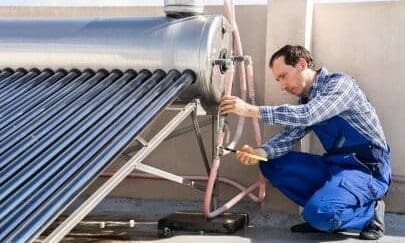
Glycol Heating-Cooling System Service for Denver, Colorado
Repairs - Recharging - New Installations - Maintenance

What is a Glycol System & Where is It Used?
A glycol heating and cooling system is a type of HVAC system that uses a mixture of water and glycol (a type of antifreeze) as the heat transfer fluid. This system is commonly used in both residential and commercial buildings to provide heating and cooling of both air spaces and domestic water.
In a glycol heating and cooling system, the glycol mixture is circulated through a network of pipes that are connected to a heat pump or chiller unit. During the heating mode, the glycol absorbs heat from the surrounding air or ground and transfers it into the building. In the cooling mode, the glycol absorbs heat from the building and releases it into the surrounding environment. One of the main advantages of a glycol heating and cooling system is its ability to provide both heating and cooling from a single system. This can help improve energy efficiency and reduce operating costs. Additionally, the glycol mixture has a lower freezing point than water, making it suitable for use in colder climates.
Overall, glycol heating and cooling systems are a versatile and efficient option for maintaining comfortable indoor temperatures in homes and businesses. Glycol System Servicing is an expertise of Teamworks Mechanical, LLC.
What are the Advantages of a Glycol System & How Does it Work?
A propylene glycol heating and chilling system typically consists of several key components:
1. Propylene glycol: This is the primary heat transfer fluid used in the system. Propylene glycol is a non-toxic, food-grade antifreeze that is commonly used in heating and cooling applications.
2. Heat exchanger: The heat exchanger is a device that transfers heat between the propylene glycol and the fluid being heated or cooled. In a heating system, the heat exchanger transfers heat from the propylene glycol to the fluid being heated, while in a chilling system, it transfers heat from the fluid being cooled to the propylene glycol.
3. Pump: The pump is used to circulate the propylene glycol through the system. It helps to ensure that the heat transfer fluid is evenly distributed and that the system operates efficiently.
4. Expansion tank: The expansion tank is used to accommodate changes in the volume of the propylene glycol as it heats up or cools down. This helps to prevent pressure build-up in the system and ensures that it operates safely.
5. Control system: The control system is used to monitor and regulate the temperature of the propylene glycol and the fluid being heated or cooled. It may include sensors, thermostats, and other components to ensure that the system operates within the desired temperature range.
In a heating system, the propylene glycol is heated using a boiler or other heat source, and then circulated through the heat exchanger to transfer heat to the fluid being heated. In a chilling system, the propylene glycol is cooled using a chiller or other cooling device, and then circulated through the heat exchanger to absorb heat from the fluid being cooled. The control system helps to maintain the desired temperature in the system by adjusting the flow rate of the propylene glycol and controlling the operation of the heat source or chiller. Call Teamworks Mechanical, LLC today to have your system serviced.
What Glycol System Services Do We Regularly Provide?
System Cleaning & Flushing
Teamworks Mechanical offers professional cleaning and flushing services for heating or cooling glycol systems. Our experienced technicians use specialized equipment and techniques to remove any buildup of contaminants, debris, or sediment that may be affecting the performance of the system. By thoroughly cleaning and flushing the glycol system, we can improve its efficiency, extend its lifespan, and ensure that it operates at peak performance. Our team is dedicated to providing top-quality service and ensuring that your glycol system is functioning optimally. Use the form below to tell us how we can be of service to you!
Glycol System Recharging
Teamworks Mechanical specializes in recharging heating or cooling glycol systems to ensure optimal performance and efficiency. Our team of experienced technicians is trained to handle the complexities of glycol systems, including identifying leaks, purging air from the system, and adding the appropriate glycol solution to maintain the desired temperature. We use high-quality glycol products and state-of-the-art equipment to recharge the system effectively and efficiently, minimizing downtime and maximizing the lifespan of the equipment. Trust Teamworks Mechanical to keep your glycol system running smoothly and reliably.
Glycol System Repairs
Teamworks Mechanical specializes in repairing the components of heating or cooling glycol systems. Our team of experienced technicians is trained to diagnose and repair issues with glycol pumps, heat exchangers, valves, and other components of these systems. We understand the importance of maintaining proper glycol levels and temperatures to ensure the efficient operation of your heating or cooling system. Whether you are experiencing a leak, a malfunctioning pump, or any other issue with your glycol system, Teamworks Mechanical has the expertise to quickly and effectively address the problem, keeping your system running smoothly and efficiently.
Please Check Out Our Certifications & Credentials at these Rating & Certification Entities






P.O. Box 33727 Northglenn, CO 80233
You may reach us by...
Tele: 720.447.3157
Text: 720.329.7769
email: info@teamworkhvac.com
Teamworks Mechanical, LLC

Mission Statement:
Recognizing that while we are not the oldest or the largest, we will not stop serving, growing and improving our offering and quality of mechanical services until we are known as the undisputed best HVAC and IAQ Company in Metro Denver.